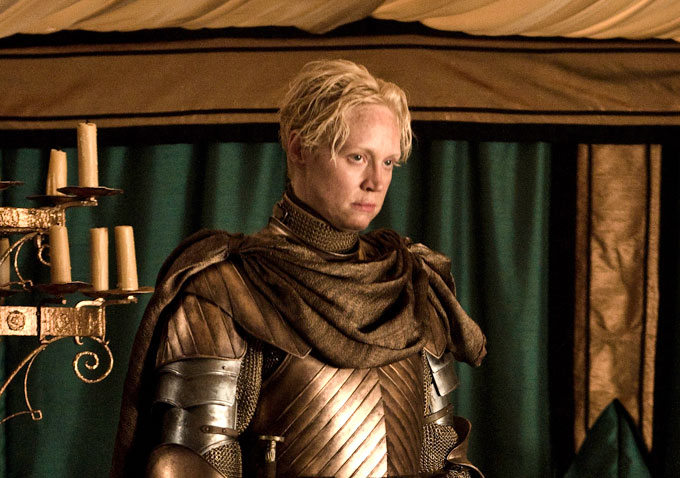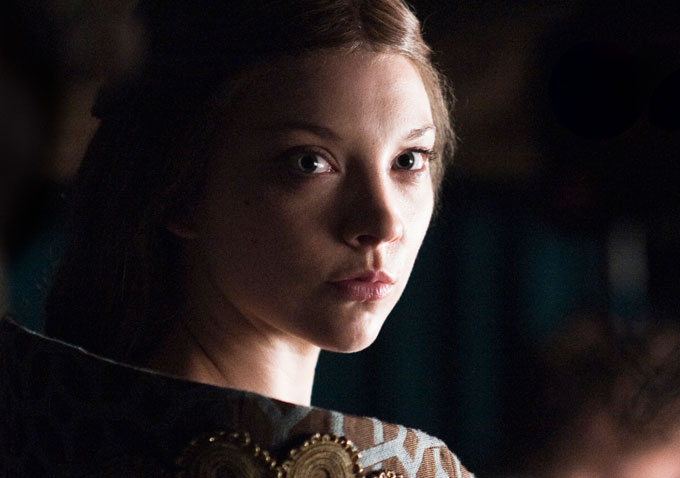By providing your information, you agree to our Terms of Use and our Privacy Policy. We use vendors that may also process your information to help provide our services. This site is protected by reCAPTCHA Enterprise and the Google Privacy Policy and Terms of Service apply.
On ‘Game of Thrones,’ It’s the Women Who Rule

During the penultimate episode of the first season of “Game of Thrones,” something unexpected happened: Ned Stark, the character believed to be the hero of the story, was unceremoniously killed by a sadistic child-king. While this left some in awe of the writer’s bold choice, many, including Neil Genzlinger of the New York Times, criticized the series and claimed that there was nowhere for the story to go, since it no longer has a hero.
He obviously wasn’t paying attention to the other characters — and needs to remember that “heroine” is also a word. In the George R. R. Martin “A Song of Ice and Fire” series on which Game of Thrones is based upon, the author created characters that transcend traditional archetypes and are deeply layered and malleable. While the first season introduced the viewer to its long list of potential heroes, as season two progresses, it has become increasingly clear that the strength of “Game of Thrones” lies in the series’ ever-growing cast of female characters.
 For example, while the audience does get the evil queen they were expecting in Cersei Lannister (Lena Headey), they also find that she’s a fiercely devoted mother who wants the best for her children, and a woman trying to buck a patriarchal system to prove that females can efficiently rule a kingdom as well as, if not better than, men. It can be hard to despise her for that, at least.
For example, while the audience does get the evil queen they were expecting in Cersei Lannister (Lena Headey), they also find that she’s a fiercely devoted mother who wants the best for her children, and a woman trying to buck a patriarchal system to prove that females can efficiently rule a kingdom as well as, if not better than, men. It can be hard to despise her for that, at least.
And each major female character is just as layered as Cersei — take Daenerys Targaryen (Emilia Clarke), technically the rightful heir to the Iron Throne of Westeros. When she was introduced in season one, Daenerys fulfilled the conventional role of the beautiful, innocent princess. But she quickly subverted the type when she ate a raw horse heart to prove to her husband’s people that she was worthy of them, and then walked into a fire on the hunch that it would hatch her three dragon eggs. On the scale of Chances-Taken-To-Be-Proven-Right, no other character can touch Daenerys.
The current season has introduced no fewer than five female characters (with at least one more, the wildling woman Ygritte, also eventually slated to debut) all of whom are not only different from one another, but are also completely unlike the female characters viewers already know. The one who most shakes up the idea of how women in a medieval world (fantastical or otherwise) should act is Brienne of Tarth (Gwendoline Christie). Like Arya Stark (Maisie Williams), Brienne is of noble birth, but has no interest in being a traditional lady. Until Renly Baratheon’s (Gethin Anthony) untimely death by murderous shadow, Brienne served as a knight in his Kingsguard, a place she won when she defeated Renly’s golden boy (and lover), Ser Loras Tyrell (Finn Jones), in a jousting tournament.
 Though some might say a female knight, or at least a female who fights, is nothing new within the constructs of medieval-fantasy, it’s important to note that Brienne is an unattractive woman who’s mind-bogglingly strong. She’s also emotionally sensitive and has suffered her fair share of abuse, both for being a woman who is not considered to be traditionally pretty and for having the audacity to serve as a knight and to secretly love Renly.
Though some might say a female knight, or at least a female who fights, is nothing new within the constructs of medieval-fantasy, it’s important to note that Brienne is an unattractive woman who’s mind-bogglingly strong. She’s also emotionally sensitive and has suffered her fair share of abuse, both for being a woman who is not considered to be traditionally pretty and for having the audacity to serve as a knight and to secretly love Renly.
Men are intimidated by her, and therefore try to shake her confidence by the only means they possess — making her feel bad about herself. To make matters worse, women don’t know what to make of her either. Though it is plain that Brienne has a chip on her shoulder, she puts on an emotional armor to keep the lingering stares and not-quiet-enough whispers from impeding her ability to serve.
The only other character that can compares to Brienne in terms of determination is Tyrion Lannister (Peter Dinklage), who comports himself with much more grace and humor than she. But what Brienne lacks in wit, she makes up for in physical strength, which is one thing Tyrion will never have on his side. And then there is Margaery Tyrell (Natalie Dormer), Renly’s infamously gorgeous widow. Throughout the novels Margaery is described as stunningly beautiful, but also soft-spoken and sweet — thus becoming the epitome of the princess readers were perhaps expecting to find in Daenerys, but settled for in Sansa Stark (Sophie Turner).
 But Martin makes it clear that Margaery is not like Sansa, who, for the most part, is still a young girl holding onto the dream that a gallant knight will come rescue her from King’s Landing. To this end, the show made the point about Margaery a little more indelicately than on the page, by having Margaery acknowledge, while naked (this is HBO we’re talking about), that Renly and her brother, Loras, were sleeping together.
But Martin makes it clear that Margaery is not like Sansa, who, for the most part, is still a young girl holding onto the dream that a gallant knight will come rescue her from King’s Landing. To this end, the show made the point about Margaery a little more indelicately than on the page, by having Margaery acknowledge, while naked (this is HBO we’re talking about), that Renly and her brother, Loras, were sleeping together.
To drive home the fact that Margaery is willing to do whatever it takes to cement Renly as the rightful heir to the Iron Throne and herself as queen, she offered to have a threesome with her brother and husband so that Renly could consummate their marriage, and hopefully provide a legitimate (read: male) Baratheon heir.
In last night’s episode, which opened with Renly’s death, Margaery never mourned her husband, Instead she emotionlessly observed how handsome he was before boldly telling Littlefinger (Aidan Gillen) that her ambition is not to be a queen, but The Queen. That sort of drive further separates her from Sansa and pits her solidly against Cersei as another woman who is willing to disregard her emotions and make strategic, sometimes cut-throat, moves to achieve her goal.
 But it’s not only ambitious, steely women that are featured. In Gilly (Hannah Murray), the pregnant wildling woman whom Samwell Tarly (John Bradley) and Jon Snow (Kit Harington) meet North of the Wall at Craster’s Keep, the audience is introduced to a woman who is so sexually and emotionally abused by her father/husband that she wants to escape with the Night’s Watch brothers in an effort to protect her unborn child from suffering, at best, her same fate.
But it’s not only ambitious, steely women that are featured. In Gilly (Hannah Murray), the pregnant wildling woman whom Samwell Tarly (John Bradley) and Jon Snow (Kit Harington) meet North of the Wall at Craster’s Keep, the audience is introduced to a woman who is so sexually and emotionally abused by her father/husband that she wants to escape with the Night’s Watch brothers in an effort to protect her unborn child from suffering, at best, her same fate.
Even though Gilly is a pathetic, blubbering little thing, the fact that she is bold enough to speak up about her situation at all effectively communicates the type of person she is. Though it’s a typically maternal role, Gilly’s strength, like Catelyn Stark’s (Michelle Fairley), lies in wanting what is best for her child.
Though some of these women are still very new to the show, they have already put the men to shame in regard to their sheer determination and willingness to do anything to reach their goals. Though strategists like Littlefinger and Tyrion don’t discount the cunning of the women around them, they still regard them as bargaining chips to be used to whichever ends they, as men, deem necessary. Elsewhere in Westeros, both Ser Davos Seaworth (Liam Cunningham) and Theon Greyjoy (Alfie Allen) underestimated the females around them.
 In Davos’s case, he was shocked by Melisandre (Carice van Houten), the murderous Priestess of Light advising Stannis, and her alternative methods of warfare, and quickly reassessed her strength and influence. But when Theon was awkwardly reintroduced to his family in the Iron lands, including his sister, Yara Greyjoy (Gemma Whelan) — whom he sexually assaulted — he was truly appalled to find that she had become a more valued family member and naval captain than he, despite the fact that he had been living away from home for ten years, and has continued to be made a fool of while in her presence.
In Davos’s case, he was shocked by Melisandre (Carice van Houten), the murderous Priestess of Light advising Stannis, and her alternative methods of warfare, and quickly reassessed her strength and influence. But when Theon was awkwardly reintroduced to his family in the Iron lands, including his sister, Yara Greyjoy (Gemma Whelan) — whom he sexually assaulted — he was truly appalled to find that she had become a more valued family member and naval captain than he, despite the fact that he had been living away from home for ten years, and has continued to be made a fool of while in her presence.
While it’s true that there’s no clear-cut protagonist in season two, that fact is part of the intrigue of “Game of Thrones.” The audience isn’t told by the writers who to root for, and can’t rely on the usual signposts to guess which characters are good, bad or safe from the sword. Instead, they’re left to choose who they hope will ultimately win the war of Westeros. Though it’s the men who lead the battles, sign the documents and make the so-called final decisions, it’s the women who are working within the confines of a restrictive system by using their influence — whether with their bodies, their cunning, or the power granted them by birth — to manipulate the action, while at the same time doing all they can to eradicate the misogynistic customs of their world. Who needs a hero? The heroines of this show are going just fine.
By providing your information, you agree to our Terms of Use and our Privacy Policy. We use vendors that may also process your information to help provide our services. This site is protected by reCAPTCHA Enterprise and the Google Privacy Policy and Terms of Service apply.

















